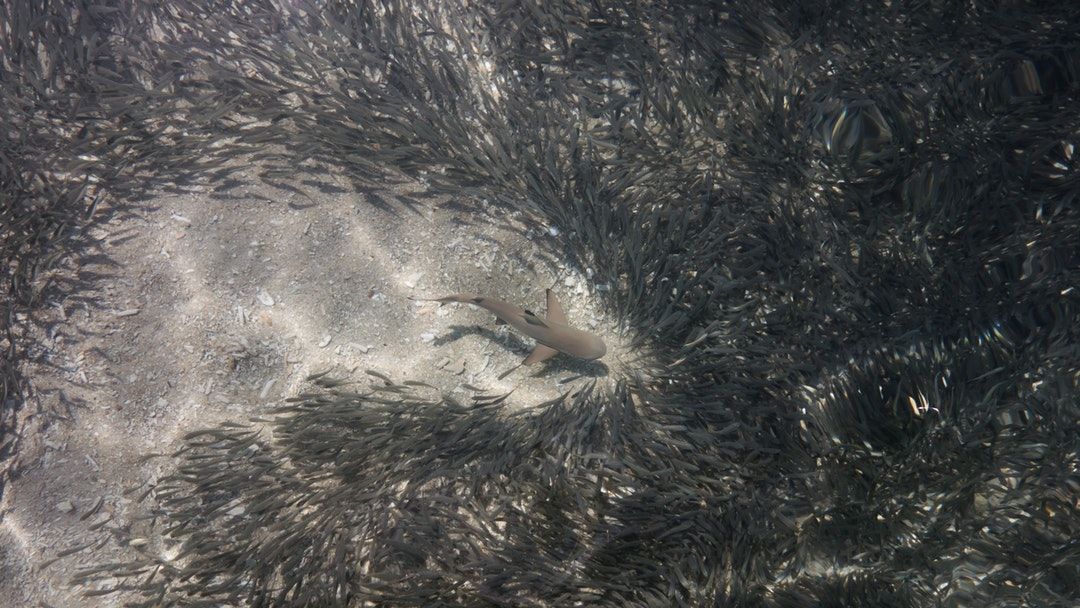More or Less; hōs epi to poly

Shark or Swim
In the dappled light that filtered through the ocean's undulating surface, the dichotomy of existence was laid bare, a tableau vivant of the ocean's unforgiving truths. Here, a shark, the embodiment of nature’s unvarnished reality, glided with a silent grace that belied the ruthless efficiency of its nature. It was a living contrast, its solitary form against the multitude, a motif as ancient as life itself.
The truth is rarely pure and never simple.
— Oscar Wilde (1854-1900)
Captain Elias leaned against the rail of his weathered boat, which had seen more seasons than the captain cared to count. He watched as the shark below navigated the complexities of life beneath the surface. Its path through the shimmering school of fish was a dance of shadows and light.
Elias had learned that the ocean was much like the people he once knew in the city, full of hidden depths and murky intentions. For all their synchrony and number, the fish understood the immutable rule of their existence—life was a constant negotiation, an unending gambit between the hunter and the hunted. "O sepi to poli," he often quoted to his wide-eyed grandson, Nikos, during their voyages. This phrase from Aristotle, meaning 'more or less,' taught the boy the shades of meaning and the necessity of balance.
Nikos, with eyes as deep and blue as the Aegean, would spend hours contemplating his grandfather’s words. To him, the ocean was a storybook, each ripple a sentence, each wave a paragraph leading to the next chapter. He understood that the shark was not the villain of this story, nor were the fish mere victims. They were all actors in a grander narrative, each fulfilling their role as nature's inscrutable author had written.
On one sun-bleached afternoon, an iridescent shimmer caught Nikos's eye as grandfather and grandson traced the lines in the water left by schools of fish. It was a shoal of sardines, moving as one entity, reacting to unseen currents and threats with a collective wisdom. As the shark from before cut through the water, parting the silver mass like a knife through the fabric, Nikos reflected on the complexity of truth. He realized that the simplicity of survival held its form of purity, a straightforwardness that human affairs often lacked.
Years went by, and Nikos grew from the boy at the ship’s rail into a man with his boat, his voyages, and his grandson to whom he passed on the wisdom of the sea.

Aristotle's De Interpretatione is a fascinating and complex work, especially in its treatment of future contingents in Chapter 9. In this chapter, Aristotle presents an argument for fatalism—the idea that every event or action is predetermined, leaving no room for free will or chance. While Aristotle clearly outlines this fatalistic argument, it is evident from his broader philosophical positions that he does not endorse such a deterministic worldview. This has led scholars to wonder how Aristotle refutes the argument for fatalism that he himself presents.
The key to Aristotle’s response lies in what is known as the "principle of equimodality," mentioned briefly in 19a33, where he states that “statements are true in the same way as the actual things are.” Though succinctly expressed, this principle carries significant implications for understanding Aristotle's rejection of fatalism.
The principle of equimodality asserts that the modality with which any statement is true—whether necessary, possible, or contingent—corresponds directly to the modality with which the actual things referred to in the statement exist. In other words, if a statement about a certain event or state of affairs is true, the nature of that truth mirrors the nature of the event or state itself. For example, if a statement about an event is necessarily true, then the event must necessarily occur. On the other hand, if a statement is contingently true, the event must likewise occur contingent on chance or circumstance rather than necessity.
This principle is crucial in Aristotle’s response to fatalism. By affirming that the truth of a statement reflects the modality of the event it describes, Aristotle introduces a logical framework that preserves the possibility of contingency and refutes the idea that all events are determined by necessity.
Aristotle makes a vital distinction between two kinds of non-necessary events: those that happen by chance and those that occur hôs epi to poly—for the most part, or typically, in one way rather than another. This distinction is essential for understanding his rejection of fatalism. Events that happen by chance are entirely contingent, meaning they could have occurred differently or not at all. Similarly, events that occur, for the most part, are not strictly necessary; they tend to happen in a particular way but can deviate from that tendency.
By applying the principle of equimodality to these types of events, Aristotle concludes that statements about such events can only be contingently true. If an event is contingent, then any statement predicting or describing that event can only be true in a contingent manner. Thus, it is impossible to claim that a contingent event will necessarily happen or that a statement about it is necessarily true.
Through this reasoning, Aristotle effectively counters the fatalistic argument he presents in De Interpretatione 9. If statements about future events are contingent because they are contingent, then the future is not predetermined by necessity. Instead, it remains open to the possibilities of chance and choice.
Aristotle’s principle of equimodality allows him to maintain that while certain events may occur necessarily—such as the rising of the sun—many other events are contingent, and their truth can only be known contingently. This preserves the logical space for free will, chance, and variability in the world, countering the deterministic perspective that fatalism imposes.
Aristotle’s response to fatalism hinges on the principle of equimodality, which links the truth of statements to the modality of the events they describe. Aristotle preserves the possibility of an open future by affirming that the world contains necessary and contingent events and that statements about these events must correspond to their respective modalities. This approach not only refutes fatalism but also provides a robust framework for understanding the relationship between language, logic, and reality in his philosophy, highlighting his commitment to a world that is not bound by necessity but rich with potential and change.
The planksip Writers' Cooperative is proud to sponsor an exciting article rewriting competition where you can win part of over $750,000 in available prize money.
Figures of Speech Collection Personified
Our editorial instructions for your contest submission are simple: incorporate the quotes and imagery from the above article into your submission.
What emerges is entirely up to you!
Winners receive $500 per winning entry multiplied by the article's featured quotes. Our largest prize is $8,000 for rewriting the following article;

At planksip, we believe in changing the way people engage—at least, that's the Idea (ἰδέα). By becoming a member of our thought-provoking community, you'll have the chance to win incredible prizes and access our extensive network of media outlets, which will amplify your voice as a thought leader. Your membership truly matters!


